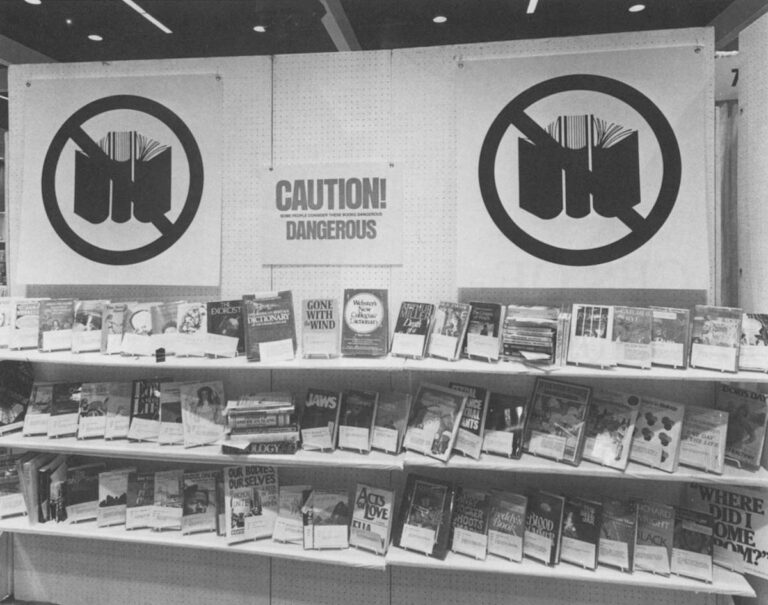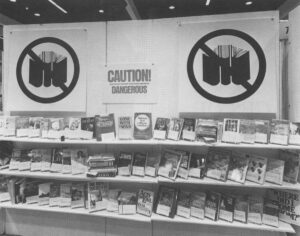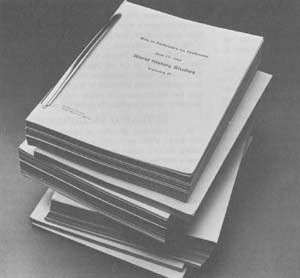Jake is one of the Depression era’s unemployed. He owns an ornery mule named Honeybunch. One day the mule dawdles while they’re crossing the railroad tracks. Jake and Honeybunch get hit by the train. They go to heaven.
The pair arrive in the clouds to find a bearded, black God with a star-studded bow tie who presides over a celestial barbecue of chicken and ribs. A jazz band is entertaining the faithful. But the unlucky Jake puts on two left wings by mistake and causes such havoc flying around that he’s thrown out of the pearly gates. The story ends happily when Jake, reinstated because of the antics of the crazy mule, is rewarded with the job of hanging out the moon and stars each night.
Jake and Honeybunch Go To Heaven by Margot Zemach is a 34-page children’s book. It contains pastel, Chagall-like drawings. And it’s one of the most controversial and censored books in the nation.
Library systems in the cities of San Francisco, Chicago and Milwaukee have refused to purchase the book, arguing that it perpetuates racist stereotypes and is based on a counterfeit Afro-American tradition.
Zemach, who is white, spent eight months researching black folklore. The prize-winning author/illustrator of more than 40 children’s books said she tried something different because there were so few story books about and for black children. She described it as a celebration of black culture.
The travails of “Jake and Honeybunch” highlight the problems of writing, publishing and buying controversial books today. Suddenly, everyone involved in the process is being labeled a censor, including, with more and more frequency, the librarians who staff the nation’s 75,000 school libraries and 14,000 public libraries.
The politically and religiously conservative Moral Majority has accused librarians of not having enough books representing their point of view on the shelves, and sent its members to cross-check lists of preferred books against card catalogues.
“We’re not the ones creating a chilling effect, we’re the ones in the ideological deep-freeze,” said Cal Thomas, the Moral Majority’s vice-president for communications.
Concern about the behavior of librarians also comes from another, more unlikely source: Judith Krug, head of the American Library Association’s Office of Intellectual Freedom. She is frightened about the dangerous self-censorship that is going on.

“Are selections based on the fact that I’m going to protect my ass?” asked Krug with dramatic rhetoric. “Oh yes,” she responds to herself.
It is logical that libraries, like schools, have become the battleground. A library is one of the most visible buildings. It is paid for by local taxes and it involves children. It is easy to go there and make your opinion heard.
As the United States has grown from an industrial to a technological society, and now to an informational society, its leaders have learned that whoever controls the channels of communication controls the message. While the massive distribution systems of satellites, television, films, and video cassettes spread information, the community’s repository of the printed word is perhaps the least intimidating and most accessible of all those information channels.
Historically, book censorship has been a series of individual, blatant attempts to remove books from public attention. During the 1950s, The Catcher In The Rye caused turmoil and became the most banned book for two decades. The J. D. Salinger classic is still a hot item, but the cumulative effect of the challenges to The Catcher In The Rye and other books today is more dangerous and pervasive.
This new phase is not found in the almost tired and comic class in northern Indiana and southern Michigan, where the Ku Klux Klan and a local fundamentalist minister have joined forces to demand that books about homosexuality be removed from public libraries. (One of their targets is the women’s self-help book, Our Bodies, Ourselves, which is currently third on the latest ranking of banned books.)
Now, it is neither the books, nor the groups which are challenging them, that are causing the concern. It is a new era of restraint, avoidance, accommodation, and even self-censorship that is creating a chill over all facets of book publishing and distribution.
After three years of more than 3,000 library challenges, the question becomes: what are the deeper, subtler consequences. The cumulative effect seems to be that authors are rewriting manuscripts to remove offensive language and sexual references, publishers are rejecting controversial books because they might jeopardize future sales of other titles, and librarians are not purchasing and removing from shelves books that may provoke complaints.
It is a time when:
The Moral Majority is demanding that librarians stock conservative books that it donates to them.
A new, revised edition of Huckleberry Finn, without any references that may offend blacks, has been proposed.
Authors are leaving their seclusion to confront angry school boards and calm troubled parents.
Librarians are lobbying state governments to pass confidentiality laws–17 at the latest count–to protect records of books checked out by their users. In some areas, religious or community leaders have demanded that librarians turn over circulation lists detailing who has checked out racy or left-wing materials.
One of the most popular booths at a recent American Library Association convention was operated by insurance salesmen, who offer a policy of protecting a librarian and library trustees from lawsuits and dismissal for book selections they make.
Some worry that the concern over individual book disputes blurs; the larger picture. “We spend too much time trying to put out the fires when we should spend more time thinking about what the First Amendment means,” said Samuel S. Vaughan, editor-in-chief and vice president of Doubleday & Co.
Vaughan said he has some “sneaky sympathies” for protest groups who feel that their point of view is not noticed. Legitimate inquiries should not automatically be turned into a confrontation, he said, and all of those involved with books should not be over-reacting.
Some librarians are responding to community requests for additional books with alternative viewpoints. The intellectual freedom committee of the Maryland Library Association distributed lists of books about anti-homosexuality and creationism at the recent national library convention in Los Angeles.
Joan Stahl, who chairs the state committee, stated that she wrote the conservative groups to unearth recent anti-homosexual and creationism materials to help her colleagues respond to requests for such books.
Currently librarians follow written policies which detail community needs and priorities in buying books. But is the librarian just following professional ethics to make sure the needs of the community are met, or is he or she responding to political pressure and choosing unworthy books?
* * *
“The authors of young adult books, whose audience is in the schools, are really feeling the pressure,” said Ellen Binder of the American Right to Read project of PEN, the organization of Poets, Playwrights, Essayists, Editors and Novelists.
“Publishers are being pressured and they are pressuring the authors. There is an economic issue involved. There is a lot of self-censorship involved,” said Binder.
An example is Judy Blume, the nation’s best-selling young adult author. She is so popular among adolescents that a book about her life has just been published. Her books have earned her publisher millions of dollars. However, even success is little protection against the fear of the censors.
Blume said she is feeling more editorial resistance now to language and sexuality than ever before. In her 1981 book, Tiger Eye, her editor asked, and she agreed, to remove a scene about masturbation. In Deenie, published a decade earlier, the appropriateness of a scene about masturbation was never questioned.
Blume, who calls the current climate “contagious and dangerous,” said she also rewrote a heated argument scene in her recent book so that it contains no foul language.
Ten Most Banned Books in American High Schools | ||
| 1. | Go Ask Alice | Anonymous |
| 2. | The Catcher in The Rye | J.D. Salinger |
| 3. | Our Bodies, Ourselves | The Boston Womens’ Health Collective |
| 4. | Forever | Judy Blume |
| 5. | Of Mice and Men | John Steinbeck |
| 6. | A Hero Ain’t Nothing But A Sandwich | Alice Childress |
| 7. | My Darling, My Hamburger | Paul Zindel |
| 8. | Slaughterhouse Five | Kurt Vonnegut, Jr. |
| 9. | The Grapes of Wrath | John Steinbeck |
| 10. | Huckleberry Finn | Mark Twain |
| (Source: National Council of Teachers of English) | ||
A recent study by the Young Adults Services Division of the American Library Association finds similar examples of “’censorship in the industry.” The group said that young adult books sold in the schools through book clubs are routinely “expurgated” to eliminate references to sex, language or violence. Words describing the human anatomy, such as “crotch” or “breast,” are systematically removed from books for the junior and senior high schools.
Judy Flum of the Alameda, Calif. library, who is chairperson of the ALA’s intellectual freedom committee for teenage books, has been working with publishers on some guidelines. Her group is involved, even though the club books are sold directly to students. Club books cause trouble for the librarians, Flum said, who have to answer a parents’ complaint as to why the original is on the shelf when a “cleaner” one is available.
During meetings with club book publishers, her group learned that “Damn” and “hell” can only be used in books recommended for seventh graders and above. The words “beer,” “wine” and “bra” can only be used for audiences past the fourth grade. And the exclamation “Oh, my God” cannot be used at all.
Flum said that in one book, the father of the main character is depicted as drinking a beer and watching television when his son comes home from school. The complaint of a parent prompted the publisher to change the scene. Now, the father is drinking a soda and reading a newspaper in the later edition because the original father was not considered a proper role model.
Scholastic Books, one of the publishers criticized by Flum’s group, said it would begin labeling the books that had been edited or retitled. But Richard Krinsley, executive vice-president of Scholastic, defended the editing practices.
“The less controversy the better, unfortunately that is the real world,” Krinsley said, adding that a single complaint can force changes. “One parent can be so explosive, so disruptive, it is very frustrating.”
Scholastic offers 1,500 titles during a school year to its young readers in grades 5 to 12. Krinsley said that, economically, he could not afford to take the chance that parental complaints about the books would cause frightened school administrators to pull the book club out of the schools. Krinsley said annual sales and numbers of books sold by Scholastic was confidential, but he added that controversy over the lists “could seriously undermine our business.”
Jean Feiwel, who recently left Avon Books to join Scholastic, spoke at an ALA seminar on “The Publishing Process: Who Decides?” She deplored the common practice of some publishers who provide writing specification sheets. “They tell an author when sex can only go as far as a good night kiss or whether profanity can be used,” she said.
Feiwel has edited several controversial young adult books involving abortion or homosexuality. She urged librarians to continue buying books which use realistic lifestyles and language. More and more, Feiwel said, books are not available in the marketplace. Book stores are refusing to stock such books for what she claimed were flimsy excuses, such as “weak covers.”
“I never thought I’d see the day that books would be available in libraries that were not available in book stores,” Feiwel said.
Although there are still about 1,000 book censorship incidents a year, according to the ALA’s Krug, the attempts have leveled off. Some strategies are changing, and she sees new issues down the line. As libraries receive less government funding and turn to their local communities for financial aid, the likelihood is that much of the money will come with strings attached.
And what do librarians do when groups offer materials free of charge? The Moral Majority seems to be taking the lead by offering books by conservative Phyllis Schlafly, which they contend belong next to the ones by feminist Betty Friedan.
Krug is advising librarians to make sure their written book selection policies include guidelines for dealing with donated materials. She feels donated books should be examined with the same criteria as other works.
Smokescreen
However, the Moral Majority’s Thomas thinks that is a smokescreen to continue to exclude those books. “First they say there is no demand, but demand is created in part by librarians on how they display and recommend books to be read,” said Thomas, who says he has been told there is no shelf space for the 62 books endorsed by the New Right group.
“Well, we are willing to donate the shelves, too,” said Thomas.
Overall, Thomas finds that conservatives now are more effective in pointing out how school libraries, public libraries and book stores discriminate against the politically conservative and traditional religious point of view. “They’re on the defensive now,” said Thomas, author of the recently published, Book Burning, in which he accuses liberals of being the worst censors.
Krug and Thomas, who are frequent media sparring partners, do agree on one thing: the critical self-censorship issue raised in the Jake and Honeybunch Go To Heaven controversy.
Is the book being rejected because it is mediocre, with weak drawings and the lack of an identifiable audience, as John C. Frantz of the San Francisco library system suggested. After all, not all books published can be purchased, and of 4,000 children’s books released annually, the city’s budget only allows for the purchase of 600.
It was San Francisco that first removed the children’s classic Mary Poppins from its libraries because of racist references, which led to the move to have it revised without the offending passages. Or are San Francisco and the other libraries which rejected the book too influenced by their personal taste. and possibly protecting themselves from controversy?
Stephen Roxburgh, editor-in-chief for children’s books at Farrar Straus & Giroux, which published Jake and Honeybunch Go To Heaven, defends the book and feels librarians are not judging it on the merits but rather are afraid of it.
“There is a certain timidity. When you are fighting battles on five fronts. who needs another battle?” asked Roxburgh. In the children’s market, libraries account for almost 80 percent of sales and strongly influence individual purchases, so for him it is both an economic and ideological fight.
The ALA’s Krug has sternly reminded librarians that whether or not they like a particular book, they have an ethical obligation to make sure that a point of view is represented.
The Moral Majority’s Thomas thinks the dispute makes librarians look like hypocrites. “They accuse us of censorship and then they rush to take off or not put on the shelves books that don’ fit their ideology,” he said.
Zemach, the book’s author, said the “book is being misread and misinterpreted.” She added: “People are running scared.”
She pointed out harsh reviews and letters of complaint her publisher had received, some of which accused Zemach of showing blacks eating watermelon. There is neither a picture nor a mention of the fruit in the book, but she feels the criticism explains some of the hysteria.
Zemach, who said she will not write another book involving blacks, agreed with one of the supportive reviews she received from the 1983 edition of Children’s Literature from the Yale University Press. That review said the book was being wrongly targeted because Afro-American culture has been demeaned or trivialized.
The review said Zemach was a victim of those same liberals with well meaning motives who “make it impossible for watermelon to be served at a racially mixed gathering.”
©1983 Rita Ciolli
Rita Ciolli, reporter on leave from Newsday, is investigating book banning in America.



